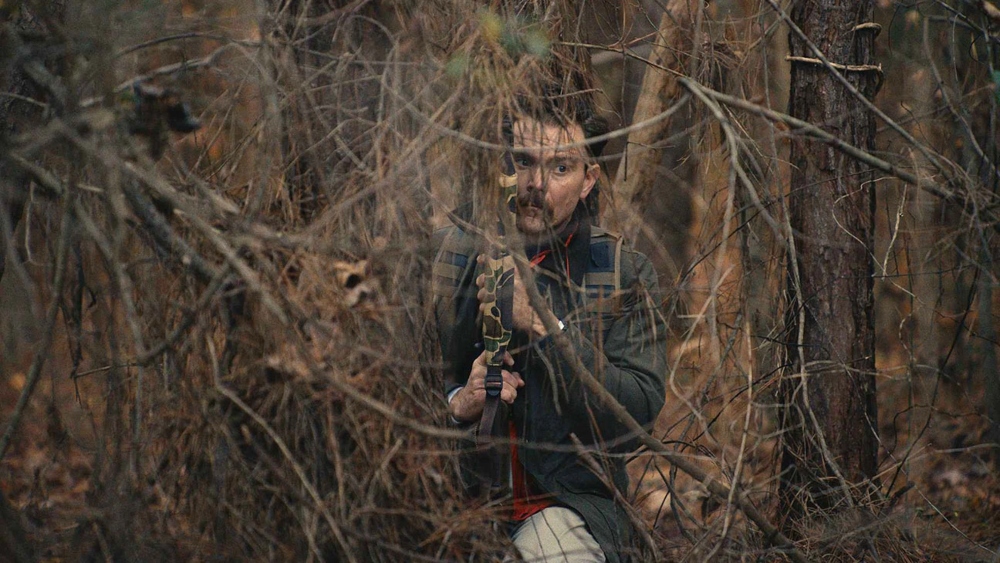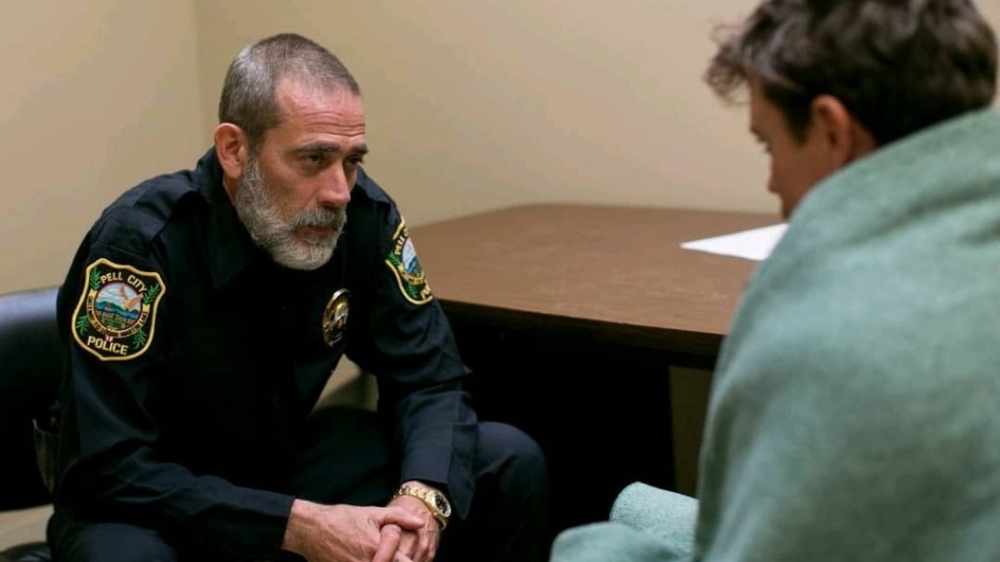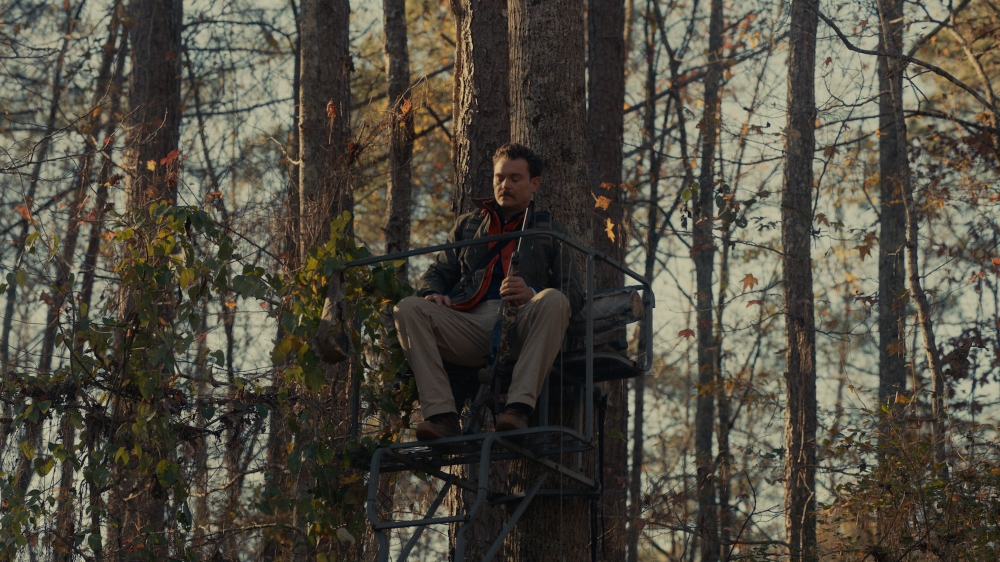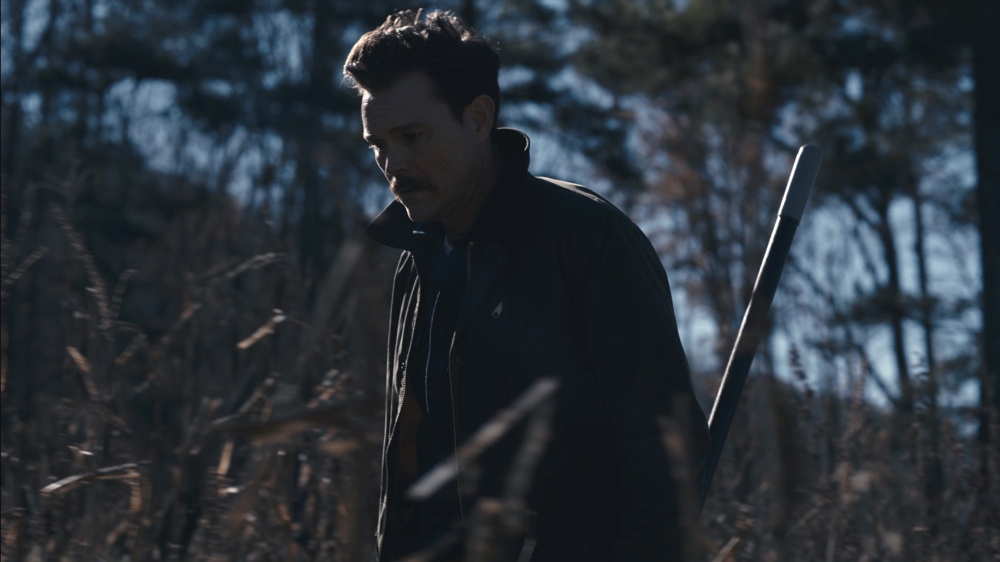As Editor of Robert Machoian‘s new indie The Integrity of Joseph Chambers, Yvette M. Amirian had the challenging job of crafting a compelling and involving narrative largely featuring just one character, an amateur hunter played by Clayne Crawford. An additional bar to clear was working with a director who had himself edited his previous film, The Killing of Two Lovers.
Below the Line recently spoke with Amirian about getting to know Machoian’s work and the benefits of collaborating with someone who writes with sound strongly in mind. She also shared how her editing process has changed during the pandemic and her outlook as a faculty member at USC, where she teaches film students.
Amirian broke down the differences she sees in working in fiction and nonfiction, as well as cutting short films. She stressed the importance of the editor in the filmmaking process and how she’s ultimately pleased that’s what she’s doing rather than other roles that would require her to be on set more.

Below the Line: I had the chance to see The Killing of Two Lovers at Sundance a few years ago. It was an interesting bit of preparation for The Integrity of Joseph Chambers, which is another slow, quiet, somewhat mournful movie. What was your knowledge of Robert Machoian and his work heading into this project, and how did the two of you connect?
Yvette Amirian: I was introduced to him through one of the Executive Producers, who is a friend of mine. I hadn’t seen The Killing of Two Lovers [but] they sent me a link. It was right after Sundance, because we met during the pandemic. I was, obviously, blown away by it. It’s exactly the type of film that I would like to be working on just in terms of [the] pacing and the character development that he does.
I think I read the script for The Integrity of Joseph Chambers first, and I was immediately drawn to it and said, ‘I have to work on this.’ Then I started learning a little bit more about him and his journey, and it just felt very serendipitous in the way that we came together. I know he had cut [The Killing of Two Lovers] himself. I think that was the thing I was maybe most nervous about because I know that when you work with someone who’s an editor themselves — and I’ve had to do that before, both with directors and showrunners on the TV side who come from editing — it’s not to say that it’s nerve-wracking because you feel like you’re not going to do a good job or anything like that, it’s just that this person is a lot more knowledgeable about this thing that I do for a living than maybe a director who doesn’t have that experience.
It actually is a huge benefit, I think, for the film as a whole, because he respects the process of editing so much. I think that’s what I felt reading the script initially. He’s really thinking through these transitions. He’s thinking through how this is going to come together, and he’s not precious about anything. When you’re going through the process, if something doesn’t work, it doesn’t work [and] it’s gone.
BTL: Is it a challenge working with very few characters in what I would call an isolated thriller?
Amirian: I’m accustomed to having a lot more coverage. And we did… there were some cases where we had a lot more coverage and we chose to go with that long single. For me, what was most challenging about that is that you feel the cut every time you make it, so it really has to be in the right place. We played with those timings quite a bit, obviously cut it much fatter initially, and then trimmed it down until it felt right. And then went back and forth with sound design and music and things like that.

BTL: Did the finished product differ substantially from the original script that you read?
Amirian: That’s a good question. I don’t think it did, not in terms of structure, [but] somehow, it feels different from the script. We’ve talked about that before, him and I. It’s hard to put my finger on how it’s different, but somehow it feels different than what I originally read. It’s not worse or better, it’s just different. I think we’re all really proud of how it came together in the end and really pleased with the final product. In a lot of ways, there’s so much that you can’t write into it in terms of the thriller aspect of it. So much of that is built in the edit and then, obviously, when the sound design comes into the picture, that changes it quite a bit as well. But the performances were all really strong and so much fun to play with and put together.
BTL: You’ve mentioned the sound design a few times. It’s truly impressive for this kind of indie film, so what was your collaboration like with that department?
Amirian: Robert really thinks about sound. You’ve seen The Killing of Two Lovers. He thinks about it a lot as he’s writing and he’s a close collaborator of [Sound Designer] Peter [Albrechtsen‘s]. They’ve worked together quite a bit. He’s one of the few directors I know who is actively thinking about that as he’s writing, which I think is really cool. So I knew as I was building it that it was going to change. I didn’t know exactly what they were going to do. I did a lot of the bare-bones stuff myself, like putting in the backgrounds and, if you see a gunshot, you hear a gunshot, [and if] he reacts to something, you hear it. All those things were in there in the offline edit.
Then we kicked it off to Peter and Will, our composer, and they put a version of it together that was a little bit heavier than even what it is now. They kicked it back to us, and based on that, we made some more edits and then sent it back to them. They did a pass, kicked it back to us, and more. It was this back-and-forth process of, “here’s how it is with the sound. Does that mean that this scene needs to go? Does it need to be shorter? Does it need to be longer?” And based on that, we kicked it back and forth a few times. We did an ADR session that I was part of, and then I got to go to Denmark for the next mix, where Peter is based. So it was very collaborative. It was a lot of fun in that way, but as far as the design and the style, that was all them — the Composer [William Ryan Fritch] and the Sound Designer. They did a fabulous job.

BTL: Is that your typical process, going back and forth so much?
Amirian: It’s actually a little bit different because I come from a background where I’ve done a lot of doc features and I’ve done a lot of TV. Depending on the project, of course… not every project is like this, but a lot of the time, because we don’t have the time or the budget to have that scope of sound design done, it’s me putting in the blueprint for what it’s going to sound like or feel like. Of course, the sound designer takes that, embellishes that, [and puts] their own fingerprints on it. But I feel like a lot of what I craft in the offline sounds somewhat similar to what it’s eventually going to sound like.
This was a very different experience in that sense because I didn’t know how far they were going to take it. For example, the baseball stuff — we knew we were going to do that, [so] we temped a few things in to make sure the timing was right, but that was all built by them. So a lot of that wasn’t in the script, it wasn’t in the offline. That was cool to see how that came together, because then, obviously, that impacts the edit, so that back and forth was necessary for us to get the timing right.
BTL: What would you say is the primary difference between your work in film and TV in terms of your process?
Amirian: TV’s a lot faster in terms of schedule. What was nice about this — and part of this was that we were cutting it during the pandemic and remotely, plus it was an independent film — was that one-on-one [time] that you got working with the director. Just crafting [it] and getting it right was really, really nice. I just love that process and I hope to get to do it more, both with Robert and other directors.
BTL: I know that working during the pandemic has been a tremendous shift for the entire industry. How has it changed your work as an editor?
Amirian: I get to work from home, obviously. I was on a documentary feature for Amazon at the time that this all started happening, so I was able to shift that to working from home, which was really cool. That was pretty seamless, and they were great with helping us do that. And then I did another documentary feature, an independent documentary feature, and then jumped onto this. And I also cut a couple [of] short films in between, so all of that was done from home.
I love working from home, it’s been great. But I miss that collaboration of being together one-on-one. I think that’s certainly been a shift for editors in the industry — there is a lot more of that hybrid happening. For me, personally, it’s been nice, because so much of what we do as editors is solitary, and then getting to take that and bring it into a room and work with your colleagues is really nice. I think I certainly see it shifting in that direction where there’s a little bit of both happening.

BTL: Do you have a preference between fiction and nonfiction? It seems like you’ve done a lot more nonfiction.
Amirian: I’ve done both. It’s funny. When you look at my resume, I feel like, yes, the bulk of it, especially recently, has been documentary features. But I actually cut a scripted feature. I supervised post for a scripted series for a couple of years, which a lot of people kind of gloss over when they look at everything that I’ve done. So I’ve actually done a pretty good balance of both, but prior to doing this one, and a couple of other fiction projects that I did around the same time during the pandemic, prior to that, I had done two or three back-to-back documentary features. I think the primary difference for me is, in documentaries, you don’t have a script. You don’t have a blueprint for what you’re doing. It’s like, “here’s everything, help us figure out the best it can be.” So you’re not just an editor, you’re also a writer and a producer and sometimes you’re kind of co-directing and trying to pull all that together.
What I love about that is the collaborative nature of it, because it really is an extreme level of collaboration because you’re having to wear all those hats and help guide the directors that you’re working with through what’s possible and what’s not possible. You have to do a lot of placeholders, like, “we need this interview, and we are missing this piece of archival.” There are a lot of legalities involved. “Can we clear this piece of footage? Can we [even] get this person [for] an interview?”
I worked on a doc feature where the main character, we didn’t even have access to him for a period of time because he was in another state, so it was literally like putting in pieces and just trying to craft something out of nothing. With fiction, you don’t have as much of that. Does that happen? Yeah. Of course, you might have something that you need to pick up. You might have a cutaway that you’re missing, but for the most part, it’s there.
Part of your job as the editor is to help figure out what might be missing. What might you need more of in pickups? I think that’s one of the benefits of an editor maybe being on set or being able to cut while they’re shooting so that you can give them those pieces of what you might need during the actual shooting process. So it’s different and it’s not different. You use a lot of the same techniques. It’s just a different muscle that you’re exercising.
BTL: You’ve also worked on a few shorts. Is your approach there different?
Amirian: I’ve only done a couple of shorts recently, and I had done maybe two, I think, earlier in my career. I don’t know. No one’s ever asked me that question! I guess it’s just a shorter version of what you’re doing. It’s different from, say, cutting a scene, because you have all these little things. It’s just that you have [fewer] of them. So you’re still doing all the same things, like the beginning, middle, and end. You want to make sure that it’s cohesive.
One of the challenges with shorts is that a lot of people are trying to get them into festivals and festivals have specific criteria that they’re trying to meet. So oftentimes, you’ll run into a situation where you say, “oh, it’s perfect at 20 minutes, but it’s too long to get it into something that only will allow you up to 15 minutes.” In college, we used to call it “killing your puppies” or whatever. You have to kill some of those to get it to be the right thing. And it’s the same thing in features. Sometimes it’s too long and something doesn’t work or a scene doesn’t play the way that you anticipated it would, and you just have to sacrifice it for the betterment of the whole big picture.

BTL: You brought up college. I know that you’re a faculty member at USC. How have how things changed since you were a student?
Amirian: Technology-wise, when I was a student there, we were cutting on Avid. I went to college in the transitional state from “we’re no longer shooting on film” to doing things more digitally. I still had the ability to cut things on film and splice things together, and that obviously doesn’t exist anymore, which I think is sad, and I wish we were teaching it because I think it’s important to understand where the history of it came from. And I try really hard to bring that into my classes, just informing them about it. The curriculum hasn’t changed a ton. It’s changed a little bit. What made it really unique when I was there is that you’re forced to try all of these different positions to understand, “do I want to write? Do I want to direct?” I came in thinking I wanted to direct, but maybe my mind is open to these other things. I came in knowing that I wanted to cut, but of course, everyone who goes to film school is like, “I’ve got to try directing to see if that’s for me.”
I very quickly realized that I personally don’t love being on set. I like being in my tiny dark room and helping other people execute their stories. I think that’s where my strength lies. I’m good with music and I’m good with sound. I’m good with all these things. You forget that editors play such a huge role in what the ultimate product is. I try really hard to teach that to my students because a lot of them come into my class with that mentality. “I’m going to be a director. Of course, I’m going to USC film school. I want to be a director.”
I always tell them, no one’s expecting you to leave this class saying, “I’m going to be an editor.” If you come out of here and say, “this is not for me, I’ve done my job.” Because it’s not for everybody. Some people have the patience for it. It is very much like weaving tiny little puzzle pieces together, and some people just don’t have that in them.
It’s like me and cinematography. I didn’t like cinematography when I took those classes, but I have so much admiration for my colleagues who do it. And I think the cinematographers who think about editing, and the editors who think about cinematography, they’re better for their job. So I just want my students to be able to go out into the real world understanding why [we do] what we do and what our craft is, [and] how that plays such a huge role in informing all the other departments that exist across the industry.
BTL: Do you have any other upcoming projects you’d like to share?
Amirian: I’m always talking to Robert about what his next projects are and hoping to get to work with him again. I’ve got a few other things on the horizon that I’m trying to work through, so hopefully [I’ll be] able to share more about [those] as well. I cut a short that just played at Claremont and won a grand prize there, which was really cool. [I’m] enjoying [seeing] all the things that I had done during the pandemic go out into the world, which is really cool.
The Integrity of Joseph Chambers is now available to buy or rent on all major VOD/digital platforms.





